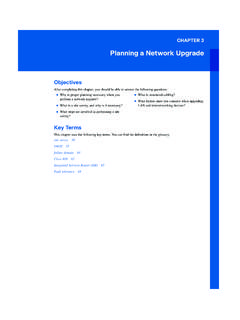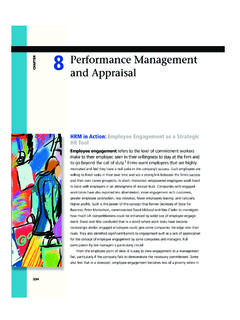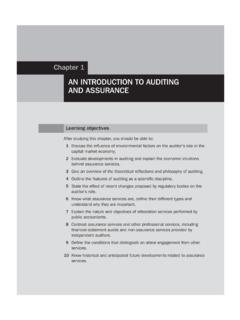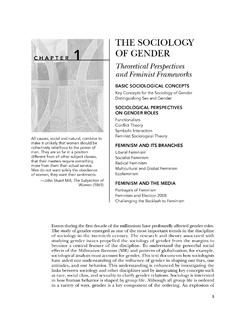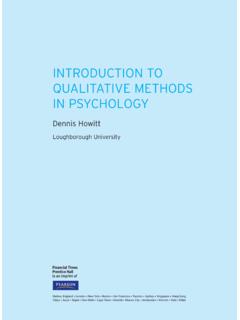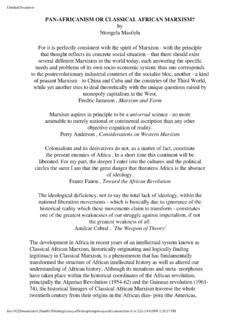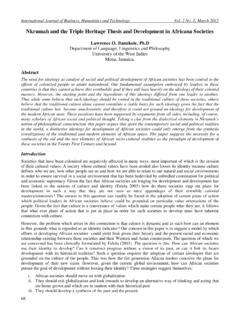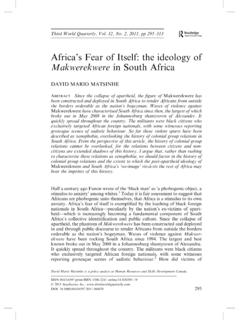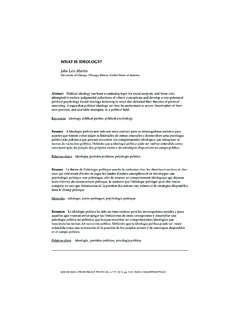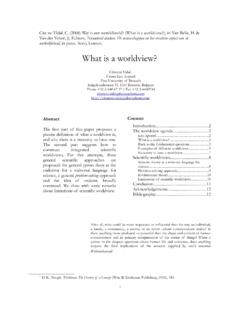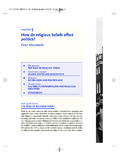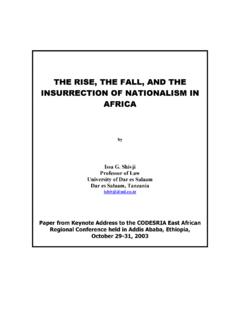Transcription of African Nationalism and the Struggle for Freedom
1 15055 African Nationalismand the Strugglefor FreedomINTRODUCTIONA frican Nationalism is a subjective feeling of kinship or affinityshared by people of African descent. It is a feeling based on sharedcultural norms, traditional institutions, racial heritage, and a com-mon historical experience. One enduring historical experienceshared by nearly all Africans was colonial oppression, discussed inthe previous chapter. Along with this sense of shared identity is acollective desire to maintain one s own cultural, social, and politicalvalues independent of outside is worth stressing that African Nationalism , like nationalismelsewhere in the world , is not new; it is as old as ancient times. In fact,in Africa, contrary to a common view in Western scholarship of Africa, African Nationalism predates colonialism.
2 In the annals of Africanhistory, one finds coherent organized African communities with a verystrong sense of identity, prepared to defend their territorial andcultural integrity against those who would want to destroy or under-mine them. For instance, when the great African king, Mansa Musa ofMali, was on a pilgrimage to Mecca in 1324 1325, the Wolof people who had been forcibly brought under the Mali kingdom seized theopportunity to rebel against the Mali kingdom. The Wolof people wereexpressing a Nationalism , a separate national identity and a desire 6/15/09 10:42 PM Page 150govern themselves in their own land. We also know that Africans didnot passively accept European rule, which was alien and destructive ofthe African social order.
3 The effective resistances put up againstEuropean colonization by the Ashanti people of Ghana, the Hehe ofTanzania, or the Zulus of South Africa suggest a very strong sense ofnational identity that was already in place and a fierce determina-tion not to succumb to any other authority but their own. The king ofthe Yao people in Tanzania had this to say to a German commanderwho had been sent to him to affirm the German colonial claim to hiscountry in 1890:I have listened to your words but can find no reason why I shouldobey you I would rather die first.. If it should be friendshipthat you desire, then I am ready for it, today and always; but tobe your subject, that I cannot be.. If it should be war youdesire, then I am ready, but never to be your subject.
4 I do notfall at your feet, for you are God s creature just as I am .. I amSultan here in my land. You are Sultan there in yours. Yet listen,I do not say to you that you should obey me; for I know that youare a free man.. As for me, I will not come to you, and if youare strong enough, then come and fetch Ghanaian king, Prempeh I of Asante, in the same tone, declinedthe British offer of protection a euphemism for colonial control. Hesaid that his kingdom wished to remain on friendly terms with allwhite people, and to do business with them, but he saw no reason whythe Asante kingdom should ever commit itself to such a policy with theBritish government. The British took over the country anyway, theking was exiled for several years to an Indian Ocean island for non-co-operation, and violent tensions between the Ashanti people and theBritish continued for ninety years, well into the beginning of the twen-tieth century.
5 The king of the Mossi people of Burkina Faso told aFrench captain: I know the whites wish to kill me in order to take mycountry, and yet you claim that they will help me to organize mycountry. But I find my country good just as it is. I have no need of know what is necessary for me and what I want. I have my consider yourself fortunate that I do not order yourhead to be cut off. Go away now, and above all, never come back. 2 TheFrench never went away and the Mossi lost their country. A leader ofthe Nama people in modern Namibia told the Germans: The Lord hasestablished various kingdoms in the world . Therefore I know andbelieve that it is no sin or crime that I should wish to remain the inde-pendent chief of my land and people.
6 3 The Germans were notimpressed either. Westerners, for their own reasons, chose to call 6/15/09 10:42 PM Page 151152 Chapter 5 African Nationalism and the Struggle for Freedomgroups tribes, despite the fact that many of them were extremelylarge with well-structured social and political institutions. Ampleevidence shows that these groups were nations occupying specificterritories that they were willing to defend, if threatened or sentiments expressed by the kings and leaders demonstratenothing but Nationalism by a people who wanted either such relationswith foreigners as exist between equals or to be left sentiments that emerged in Eastern Europe following thecollapse of communism are clearly manifestations of Nationalism , notunlike what one would have seen in Africa on the eve of the Europeanscramble for the continent.
7 When the Soviet Union collapsed, its formerrepublics split off, some of them facing internal conflicts as variousgroups sought to retreat into their linguistic or cultural disintegrated, throwing its people into a nasty civil ended in 1992 with agreement to split into two coun-tries: the Czech Republic and Slovakia. What binds all these groups isa common heritage, based on religion, language, and historical experi-ence. The historical experience of living under foreign hegemony orbeing governed by political parties thought to be manipulated by anoutside power has been a potent driving force behind national seces-sionist attempts in Eastern Europe as well as in modern African NATIONALISMA fter colonial rule had been firmly established, Africans continued toexhibit many forms of disaffection and resistance.
8 Because Africa hadbeen sliced into different colonies, as the resistance coalesced, organi-zations formed to protest various elements of colonial rule were oftenbased on the territory under one colonial power (such as France,Britain, or Germany). Since it was virtually impossible for Africans toorganize on a country-wide basis, regional or ethnic organizationsbecame the most practical option. Because the colonizer was Europeanand the colonized was African , such organizations came to be seen,particularly by outsiders, almost entirely in racial terms. It served thecolonial powers interests for them not only to play ethnic groupsagainst one another, but also to characterize the more militant or out-spoken ones as being Mau Mau uprising against British rule in Kenya is a perfectexample of a movement that was presented in the Western media asan aimless, fanatically violent rebellion bent on killing and maimingany white person for the fun of it.
9 Such a racial interpretation was sim-plistic and wrong. The goal of such an interpretation was to divorce thestruggle from the legitimate grievances that undergirded it. As I havealready pointed out, European colonizers had some racial motives 6/15/09 10:42 PM Page 152 Modern African Nationalism153seizing African territories, but the Africans simply wanted theirterritories back and the Freedom to live their lives as they saw fit. Thissurge in African Nationalism was fueled by several catalytic factorsbesides the oppressive colonial experience itself: missionary churches, world Wars I and II, the ideology of Pan-Africanism, and the League ofNations/United Nations. Each of these factors will now be OppressionAs was pointed out in the last chapter, colonization was mostly anegative, exploitative, and oppressive experience.
10 Africans have badmemories of that experience, even though some may appear to havebenefited materially. They were humiliated, their culture denigratedand distorted, and their land confiscated. European immigrants, whowere encouraged to come to Africa as pioneer farmers and given largetracts of land to farm, forced Africans to provide cheap labor, whichresulted in severe consequences for African communities. Large plan-tations were established for growing cash crops. How could anyonenot expect Africans to resent this after a while? In fact, at the verybeginning of colonial occupation, the African resistance took the formof armed revolt. The Temne and the Mende of Sierra Leone revoltedagainst the hut tax. The Nama and the Herero people in Namibiarevolted against German forced labor.

